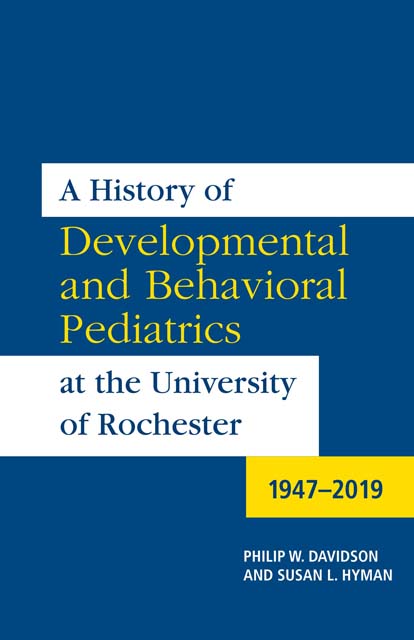Book contents
- Frontmatter
- Dedication
- Contents
- Foreword
- Preface
- Epigraph
- Chapter One Historical Context
- Chapter Two Laying a Foundation
- Chapter Three Opportunities
- Chapter Four Changing of the Guard
- Chapter Five Emergence of Focus
- Chapter Six Team Building
- Chapter Seven Maturation
- Interlude: (Or Let Us Take A Break From Acronyms)
- Chapter Eight Expansion
- Chapter Nine Emergence of Research Programs
- Chapter Ten Change in the Wind
- Chapter Eleven Beyond Dreams
- Chapter Twelve DBP’s Clinical Program Expands
- Chapter Thirteen Dramatic Growth of Autism Research
- Chapter Fourteen Changing Relationships
- Epilogue
- Acknowledgments
- List of Abbreviations
- References
- About the Authors
Epilogue
Published online by Cambridge University Press: 14 June 2023
- Frontmatter
- Dedication
- Contents
- Foreword
- Preface
- Epigraph
- Chapter One Historical Context
- Chapter Two Laying a Foundation
- Chapter Three Opportunities
- Chapter Four Changing of the Guard
- Chapter Five Emergence of Focus
- Chapter Six Team Building
- Chapter Seven Maturation
- Interlude: (Or Let Us Take A Break From Acronyms)
- Chapter Eight Expansion
- Chapter Nine Emergence of Research Programs
- Chapter Ten Change in the Wind
- Chapter Eleven Beyond Dreams
- Chapter Twelve DBP’s Clinical Program Expands
- Chapter Thirteen Dramatic Growth of Autism Research
- Chapter Fourteen Changing Relationships
- Epilogue
- Acknowledgments
- List of Abbreviations
- References
- About the Authors
Summary
The best way to predict the future is to create it.
—Abraham LincolnThe Merriam-Webster dictionary defines “epilogue” as a concluding section that rounds out the design of a literary work. Not included in this definition is the motivation for writing the book. Why was the book written? Why should anyone care if the book was ever written? How important is this story for the future leaders and implementers of IDD programs at the University of Rochester? Are there lessons in the narrative that can guide program developers in disciplines other than IDD, or Pediatrics, or Medicine, or academia, for that matter?
This book tells the story of a journey that began with a one small clinic in one department staffed by one faculty member which served a limited number of consumers. Over the ensuing six decades, these humble roots spawned a well-funded, multifaceted effort employing 88 faculty and staff members, which now affects the lives of thousands of people. What are we to make of this remarkable growth? First, the journey is not over. In fact, we would argue that it has embodied a common theme of the need for human service punctuated by episodes of opportunity for change, good and bad luck, unanticipated serendipity, and timing. Most of all, it has a base of principled and well-intentioned leadership, rooted in sound philosophy and genuine concern for the needs of people with IDD and their families. These human needs are not going to go away any time soon; thus, continued program development is bound to occur. But principled and well-intentioned leadership could easily be disrupted, ultimately undermining the program's future trajectory and even its survival.
Successful change in any setting, but particularly in academia, requires development and maintenance of partnerships. Almost every new initiative in our history has involved partnering with individuals or groups outside the DBP organization. Future growth will depend even more on these and other, newer partnerships. There are already such forces at work. For example, the development of an integrated and focused approach to basic science within the Neuroscience Institute and application for IDDRC funding. This brings with it many opportunities. The focus on translational science places a spotlight on basic science. In other words, an integrated IDD Research Center may be the first step in a URMC-wide expansion of focus on IDD.
- Type
- Chapter
- Information
- A History of Developmental and Behavioral Pediatrics at the University of Rochester1947-2019, pp. 107 - 112Publisher: Boydell & BrewerPrint publication year: 2021



